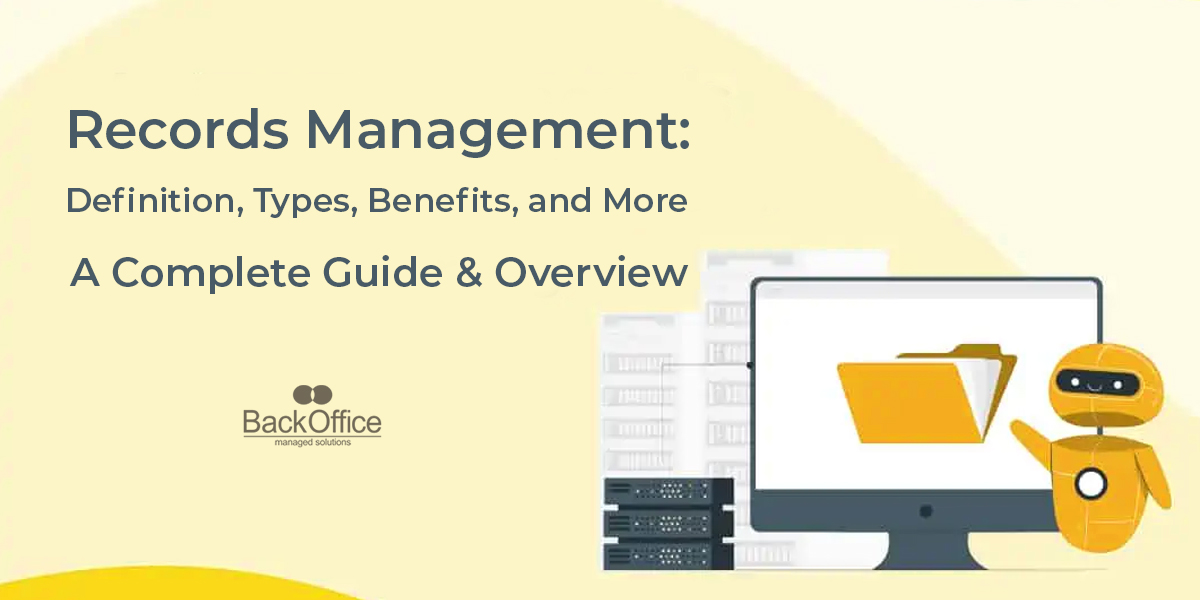A Complete Guide & Overview
How to Find the Best Records Management Services?
MASTERING RECORDS MANAGEMENT: A COMPREHENSIVE GUIDE TO DEFINITION, TYPES, BENEFITS, AND MORE
In today’s digital age, managing and organizing records is crucial for businesses to operate efficiently, comply with regulations, and protect sensitive information. Effective records management not only streamlines processes but also mitigates risks associated with data breaches, litigation, and loss of vital information. This comprehensive guide provides an overview of records management, its types, benefits, and key considerations for finding the best records management services. So, let’s dive in!
INTRODUCTION
Effective records management is the systematic and strategic approach to handle an organization’s records throughout their lifecycle, from creation to disposal. It involves processes, policies, and technologies to ensure the accurate capture, classification, storage, retrieval, and disposition of records.
The significance of records management cannot be understated. Without proper management, businesses may face challenges such as information overload, inefficiency, data loss, compliance breaches, and legal complications. A well-implemented records management system enables businesses to streamline operations, improve decision-making, enhance data security, and ensure regulatory compliance
RECORDS MANAGEMENT…?
Records management refers to the practice of controlling an organization’s records, regardless of format or medium, to meet operational, legal, fiscal, and regulatory requirements. It encompasses activities related to the creation, maintenance, storage, retrieval, and disposal of records.
Key components of records management include policies and procedures, recordkeeping systems, retention schedules, metadata, and compliance mechanisms. By implementing these components, organizations can establish a structured approach to records management and ensure the integrity, authenticity, and accessibility of their records.
TYPES OF RECORDS MANAGEMENT
There are various types of records management approaches, including physical records management, digital records management, and hybrid records management.
- PHYSICAL RECORDS MANAGEMENT
Physical records management involves the handling and storage of tangible records such as paper documents, photographs, maps, and other physical media. It includes activities like indexing, filing, shelving, and retrieving physical records from off-site storage facilities.
- DIGITAL RECORDS MANAGEMENT
Digital records management focuses on the management of electronic records, such as emails, spreadsheets, word documents, multimedia files, databases, and websites. It entails capturing, organizing, preserving, and providing access to digital records using specialized software and technologies.
- HYBRID RECORDS MANAGEMENT
Hybrid records management combines both physical and digital records management approaches. It caters to organizations that have a mix of physical and electronic records, allowing them to implement integrated systems and processes to manage all record types effectively.
BENEFITS OF RECORDS MANAGEMENT
Implementing effective records management practices brings numerous benefits to organizations of all sizes and industries.
- IMPROVED ORGANIZATION AND ACCESSIBILITY
Proper records management facilitates efficient organization and easy retrieval of records when needed. With well-defined indexing, classification, and search capabilities, businesses can locate records quickly, saving time and effort.
- ENHANCED COMPLIANCE AND LEGAL PROTECTION
Records management ensures compliance with legal, regulatory, and industry-specific requirements. It helps organizations meet document retention and disposal guidelines, reducing the risk of penalties, fines, and legal disputes. Proper records management also provides evidence of compliance during audits or investigations.
- COST SAVINGS AND EFFICIENCY GAINS
Well-managed records minimize storage costs, optimize office space, and reduce administrative overhead. By eliminating duplicate or obsolete records and implementing automated workflows, organizations can achieve cost savings and operational efficiency.
HOW RECORDS MANAGEMENT WORKS
Records management encompasses several key stages and processes that ensure the proper handling of records throughout their lifecycle.
- RECORDS CREATION AND CAPTURE
The first step in records management is the creation and capture of records. This includes generating documents, emails, reports, and other records in various formats. Organizations must establish guidelines for record creation, including standardized templates and metadata tagging.
- CLASSIFICATION AND INDEXING
Records need to be classified and indexed to facilitate easy retrieval and identification. This involves assigning appropriate metadata, such as document types, dates, author information, keywords, and relevant categories. Effective classification and indexing ensure records are organized and can be found efficiently.
- RETENTION AND DISPOSAL
Records must be retained for the required periods based on legal, regulatory, and business requirements. Retention schedules specify how long records should be kept, taking into account factors like record type, industry regulations, and litigation risks. Once the retention period expires, records should be disposed of securely and in compliance with data protection laws.
KEY CONSIDERATIONS FOR CHOOSING RECORD MANAGEMENT SERVICES
When selecting records management services, organizations should consider the following factors to ensure their specific needs are met:
- IDENTIFYING YOUR ORGANIZATION’S NEEDS: Before outsourcing records management, identify your organization’s requirements and goals. Consider factors like the volume and types of records, retention periods, compliance obligations, and security requirements.
- ASSESSING SERVICE PROVIDER CAPABILITIES Evaluate the capabilities and experience of potential service providers. Look for providers with expertise in managing records in your industry and ask for references or case studies. Assess their infrastructure, security measures, disaster recovery plans, and compliance certifications.
- EVALUATING SECURITY AND CONFIDENTIALITY MEASURES Ensure that the service provider follows stringent security measures to protect your records. Consider factors like physical security at storage facilities, access controls, encryption, data backup, and adherence to privacy regulations.
DOCUMENT MANAGEMENT COMPANIES
Document management companies’ offer specialized services to help organizations streamline their document-related processes. These companies provide a range of solutions, including document digitization, indexing, storage, retrieval, and secure destruction.
When selecting a document management company, consider factors like their reputation, track record, service offerings, technology infrastructure, customer support, and pricing models. Request proposals from multiple providers to compare their offerings and choose the one that best aligns with your organization’s requirements.
DOCUMENT MANAGEMENT SERVICES IN DUBAI
Document storage services play a vital role in ensuring the secure and efficient management of records in Dubai. Leading record management services in Dubai offer state-of-the-art facilities equipped with advanced security systems, climate control, fire suppression mechanisms, and strict access controls.
Organizations in Dubai can benefit from these services by securely storing their physical records off-site, freeing up valuable office space and ensuring the protection and accessibility of records when needed.
FINDING THE BEST RECORDS MANAGEMENT SERVICES
When searching for the best records management services, consider the following steps:
- Conducting Research and Due Diligence
Research different service providers, review their websites, and assess their reputation. Look for customer reviews, testimonials, and ratings. Additionally, seek recommendations from industry peers or professional networks.
- Requesting Proposals and Comparing Options
Contact multiple service providers and request detailed proposals tailored to your organization’s needs. Compare the proposals based on factors like cost, services offered, technology infrastructure, security measures, and compliance capabilities. Conduct interviews or virtual meetings to get a better understanding of their expertise and suitability.
- Developing a Records Management Plan
Create a comprehensive records management plan that outlines the goals, objectives, and strategies for managing records. Define roles and responsibilities, establish policies and procedures, and provide guidance on record creation, classification, retention, and disposal.
- Implementing Policies and Procedures
Translate the records management plan into actionable policies and procedures. Ensure employees are aware of the policies and provide training on proper recordkeeping practices, including filing, labeling, and data entry.
- Training Employees on Records Management
Employees play a critical role in records management. Conduct regular training sessions to educate employees on the importance of records management, best practices, and compliance requirements. Encourage a culture of record stewardship and emphasize the benefits of effective records management.
CONCLUSION
Proper records management is a crucial component of efficient and compliant business operations. By implementing effective records management practices, organizations can improve organization and accessibility, enhance compliance and legal protection, and achieve cost savings and efficiency gains. When choosing records management services, consider your organization’s specific needs, evaluate service providers’ capabilities, and prioritize security and confidentiality measures. By following this guide, you can find the leading record management company in Dubai and streamline your records management processes and maximize the benefits of effective records management.
CTA: Don’t let inefficient records management slow down your business operations. Contact Back Office, the leading record management company in Dubai, to streamline and optimize your records management processes. With our expertise and cutting-edge technology, we can help you improve organization, accessibility, compliance, and cost savings. Contact us today to learn more.




